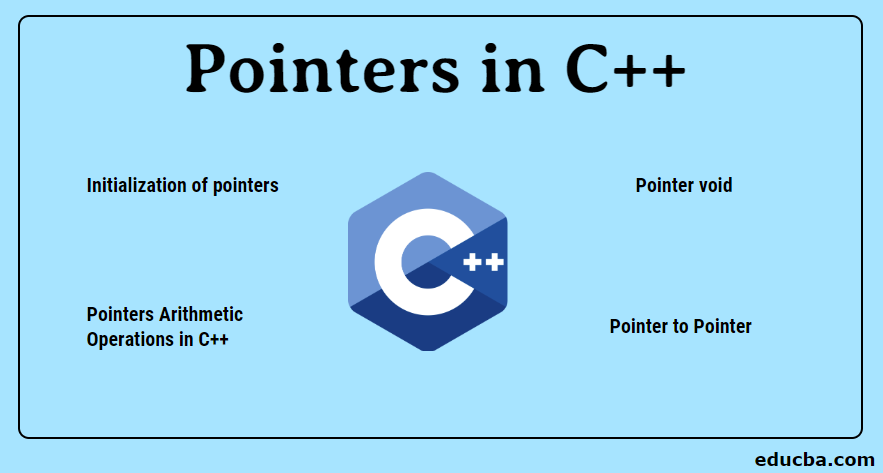
void Pointers in C++ (cpp): Usage, Advantages and Generic Functions
Introduction to void Pointers in C++
In C++ programming, void pointers play an important role in enabling flexibility and versatility of C++ program. These pointers provide a way to handle data of unknown types, which is particularly useful in scenarios where the type of data being handled is determined at runtime rather than compile time.
Unlike regular pointers, which are explicitly associated with a specific data type (e.g., int*, float*, char*), void pointers (void*) can point to any type of data. This capability allows developers to create more generic and reusable code.
This article will explore the concept of void pointers, their characteristics, and how they are used in C++. We’ll also discuss the advantages of void pointers and provide practical examples where their functionality proves invaluable. By the end, you’ll understand why void pointers are considered an essential feature in C++ programming.
What are void Pointers in C++:
A void pointer is a special type of pointer in C++ that can point to data of any type. The syntax for declaring a void pointer is as follows:
void* ptr;
A void pointer, also known as a generic pointer, it can point to any data type, including variables, functions, and even other pointers. The void pointer is denoted by void* as its data type. However, since it lacks a specific data type, you cannot directly dereference a void pointer.
To access the value it points to, the void pointer must first be typecast into the appropriate data type. This makes void pointers highly versatile but also requires careful handling to avoid runtime errors.
Why Use Void Pointers in C++?
Void pointers are often used in situations where the data type is unknown at compile time or where generic programming is required. Here are some common reasons for using void pointers:
- Generic Programming: Void pointers allow the creation of functions or data structures that can work with any data type. This makes code more reusable and adaptable.
- Interfacing with Low-Level Code: When interacting with hardware or system-level APIs, void pointers are often used to handle raw data.
- Dynamic Memory Allocation: Functions like
malloc()in C/C++ return a void pointer to the allocated memory. The void pointer must then be cast to the appropriate type. - Polymorphism: While polymorphism in object-oriented programming is usually achieved through virtual functions, void pointers offer a low-level way to achieve type flexibility.
Using void Pointers for Generic Functions in C++:
#include <iostream>
// Generic function to print the value based on the data type
void printValue(void* ptr, char type) {
switch (type) {
case 'i':
std::cout << "Value (int): " << *static_cast<int*>(ptr) << std::endl;
break;
case 'd':
std::cout << "Value (double): " << *static_cast<double*>(ptr) << std::endl;
break;
case 'c':
std::cout << "Value (char): " << *static_cast<char*>(ptr) << std::endl;
break;
default:
std::cout << "Unknown data type." << std::endl;
}
}
int main() {
int intValue = 42;
double doubleValue = 3.14;
char charValue = 'A';
printValue(&intValue, 'i');
printValue(&doubleValue, 'd');
printValue(&charValue, 'c');
return 0;
}Output:
Value (int): 42
Value (double): 3.14
Value (char): AAdvantages of Using void Pointers in C++:
- Flexibility: Void pointers allow you to handle data of varying types and enable generic programming.
- Reduced Code Duplication: Using void pointers reduces the need for multiple versions of functions for each data type, leading to more concise code.
- Dynamic Data Handling: Void pointers are ideal for scenarios where data type determination occurs at runtime or changes frequently.
- Versatility: A single void pointer can be used to handle multiple data types, reducing the need for multiple function overloads or templates in some cases.
- Interfacing with Libraries: Many third-party libraries and APIs use void pointers to provide generic interfaces, making it easier to work with varied data types.
- Memory Efficiency: By avoiding the need to declare separate pointers for each data type, void pointers help optimize memory usage in certain scenarios.
Summary
Void pointers in C++ offer a powerful tool for generic programming and handling data of unknown types. Their flexibility, ability to work with dynamically allocated memory, and ease of passing generic arguments to functions make them invaluable in a variety of scenarios. By understanding the concept of void pointers and utilizing them judiciously, you can enhance the efficiency and adaptability of your C++ programs.